Coffee Alternatives And Tea
What Can You Substitute for Yogurt or Sour Cream in Coffee Cake
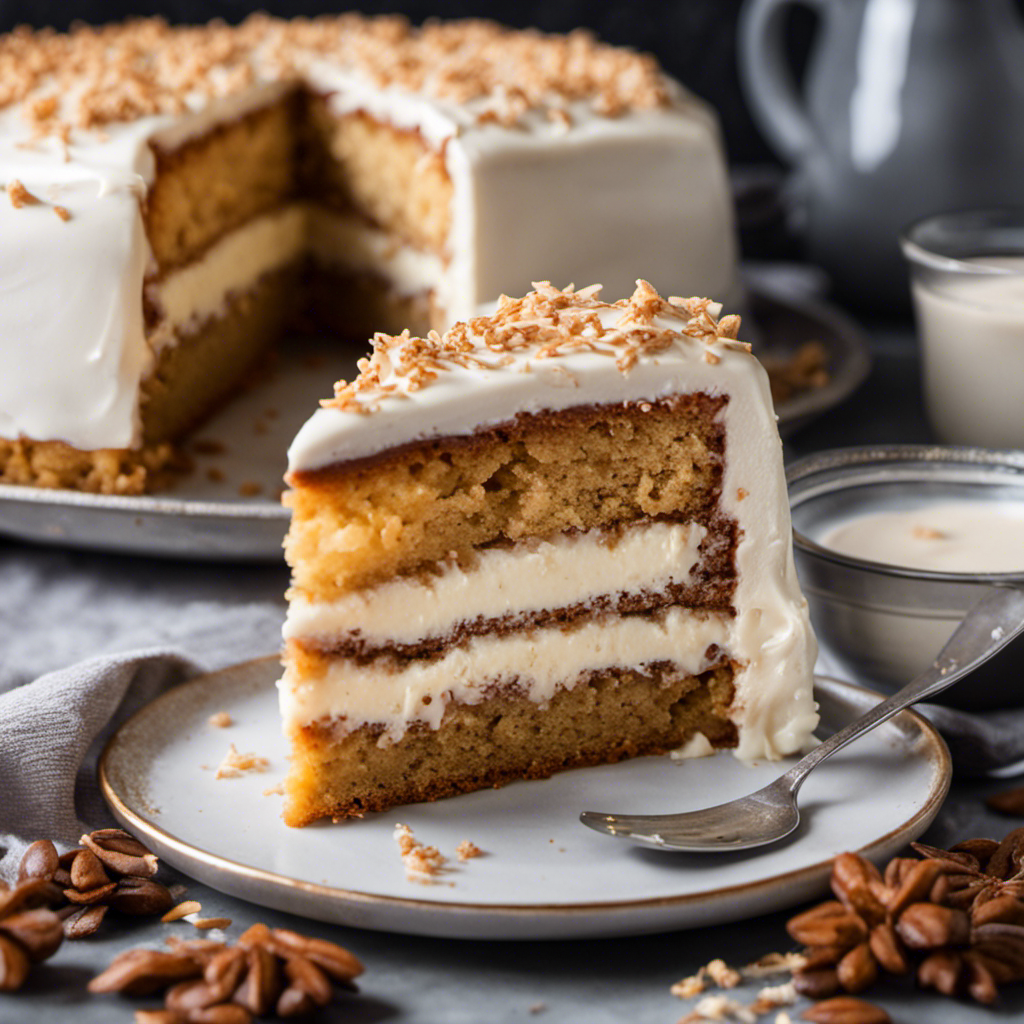
I’ve always held the view that coffee cake is the ideal treat for any moment. However, what do you do if lactose doesn’t agree with you, or you just choose to steer clear of dairy products? Worry not, dear friends, as I’ve found a plethora of delicious alternatives to yoghurt and sour cream in coffee cake.
From creamy coconut to velvety silken tofu, these alternatives will have your taste buds dancing with delight. Join me on this dairy-free journey as we explore the possibilities and create a coffee cake that is equally satisfying and kind to our bodies.
Key Takeaways
- Coconut-based alternatives such as coconut yogurt, coconut cream, and coconut milk can be used as substitutes for yogurt or sour cream in coffee cake, adding creaminess, tanginess, richness, and a hint of tropical flavor.
- Regular milk combined with lemon juice or vinegar can be used as a substitute for buttermilk in coffee cake, providing creaminess and moisture.
- Lemon juice adds a refreshing flavor to coffee cake and acts as a natural acid, helping to activate baking powder or soda for a lighter and fluffier texture.
- Applesauce can be used as a dairy-free substitute for yogurt or sour cream in coffee cake, adding sweetness and moistness while being lower in fat and calories.
Dairy-Free Alternatives
If you can’t have dairy, you can try using coconut yogurt or almond milk as alternatives in your coffee cake. Not only are these options dairy-free, but they also bring their own unique flavors and benefits to the table.
Coconut yogurt adds a creamy and tangy element to the cake, while almond milk provides a subtle nutty undertone. Additionally, coconut cream can be used to replace both yogurt and sour cream in the recipe. It adds richness and a hint of tropical flavor to the coffee cake. Moreover, coconut cream is known for its health benefits, such as boosting the immune system and promoting healthy digestion.
Now, let’s move on to discussing the alternative of buttermilk.
Buttermilk
When it comes to baking, sometimes you find yourself in need of buttermilk but don’t have any on hand. Fear not, because there are a few simple alternatives you can use.
One option is to use regular milk as a substitute, combined with a tablespoon of lemon juice or vinegar for that tanginess that buttermilk brings to recipes.
Milk as Substitute
You can use milk as a substitute for yogurt or sour cream in coffee cake. It may not be the exact same texture or taste, but it can still give your cake a creamy and moist texture. Here are four reasons why milk can be a great alternative:
-
Availability: Milk is easily accessible and can be found in most households, making it a convenient option when you don’t have yogurt or sour cream on hand.
-
Lighter option: If you’re looking for a lighter alternative, using milk can help reduce the fat content in your coffee cake while still adding moisture.
-
Milk alternatives: If you have dietary restrictions or prefer plant-based options, you can use milk alternatives like almond milk, soy milk, or coconut milk to achieve a similar result.
-
Homemade yogurt: If you have the time and ingredients, you can even make your own homemade yogurt to use in your coffee cake recipe. This adds a personal touch and allows you to control the ingredients used.
Lemon Juice Alternative
Looking for a tangy twist in your recipe? Try using lemon juice as an alternative ingredient. Not only does it add a refreshing flavor, but it also brings a myriad of health benefits to your baking. Lemon juice is known for its high vitamin C content, which boosts the immune system and promotes healthy skin. Additionally, it is a natural source of antioxidants that help fight inflammation and reduce the risk of chronic diseases. In baking, lemon juice acts as a natural acid, similar to yogurt or sour cream, which helps activate baking powder or soda, resulting in a lighter and fluffier texture. It also adds a subtle tanginess that complements sweet flavors, making it perfect for coffee cakes, muffins, and even frosting. So, next time you’re looking to switch things up in your recipe, give lemon juice a try!
| Health Benefits | Uses in Baking |
|---|---|
| Boosts immunity | Activates baking powder/soda |
| Promotes healthy skin | Adds tanginess to sweet flavors |
| Fights inflammation | Lightens and fluffs texture |
| Reduces risk of chronic diseases | Complements coffee cake, muffins, and frosting |
Vinegar for Tanginess
To add tanginess to your recipe, try using vinegar as an alternative ingredient. Vinegar is not only a versatile cooking ingredient but also offers numerous health benefits.
Here are four creative ways you can incorporate vinegar into your cooking:
-
Salad dressings: Mix vinegar with olive oil, herbs, and seasonings for a tangy and refreshing dressing that complements any salad.
-
Pickling: Vinegar is essential for pickling vegetables, adding a tangy and acidic flavor that enhances the preservation process.
-
Marinades: Tenderize and flavor your meats by marinating them in a mixture of vinegar, herbs, and spices. The acidity of vinegar helps to break down the proteins and infuse them with delicious flavors.
-
Baking: Add a teaspoon of vinegar to your cake or muffin batter to create a moist and tender texture. It also acts as a leavening agent, helping your baked goods rise.
Applesauce
If you’re in a pinch, try substituting applesauce for yogurt or sour cream in your coffee cake recipe. Not only does it provide a dairy-free option, but it also adds a delightful sweetness and moistness to the cake.
Applesauce is made by cooking apples until they break down into a smooth puree, resulting in a thick and creamy consistency that mimics the texture of yogurt or sour cream. This substitution is perfect for those who are lactose intolerant or following a dairy-free diet.
Additionally, applesauce is a healthier alternative as it contains less fat and calories compared to yogurt or sour cream. It also provides a good source of dietary fiber and vitamin C.
Greek Yogurt
When it comes to dairy-free alternatives, there are several options available for those who cannot consume traditional yogurt. From coconut milk yogurt to almond milk yogurt, these alternatives offer a creamy and delicious option for those with dietary restrictions.
Not only do these dairy-free alternatives provide a tasty alternative, but they also offer a range of health benefits. Yogurt, whether dairy-free or not, is known for its probiotic properties, which can support gut health and boost the immune system. Additionally, yogurt is a good source of protein, calcium, and vitamin D, making it a nutritious choice for those looking to incorporate more plant-based options into their diet.
Dairy-Free Alternatives
You can try using almond milk or coconut milk instead of yogurt or sour cream in your coffee cake. These non-dairy options provide a creamy texture and add a unique flavor to your baked goods.
Here are four substitutes for yogurt in baking that will elevate your coffee cake to the next level:
-
Almond Milk: This plant-based milk is made from ground almonds and has a slightly nutty taste. It adds moisture and richness to your coffee cake without the dairy.
-
Coconut Milk: With its creamy consistency and tropical flavor, coconut milk is a delicious option. It adds a subtle sweetness and a hint of coconut flavor to your coffee cake.
-
Cashew Cream: Made from blended cashews and water, cashew cream is a versatile substitute for yogurt. It has a smooth texture and a mild, slightly sweet taste.
-
Silken Tofu: Surprisingly, silken tofu can be used as a yogurt replacement in baking. It provides a creamy texture and adds protein to your coffee cake.
Health Benefits of Yogurt
One of the health benefits of yogurt is that it contains probiotics, which can support a healthy digestive system. Probiotics are live bacteria and yeasts that are good for your gut health. They help maintain a balance of good bacteria in your intestines, which can improve digestion and nutrient absorption.
The benefits of probiotics extend beyond just digestion. They can also boost your immune system, reduce inflammation, and even improve mental health. Yogurt is a delicious and versatile way to incorporate probiotics into your diet. Whether enjoyed plain, mixed with fruit, or used as a base for smoothies, yogurt is a nutritious option that can provide numerous health benefits.
Speaking of alternatives to yogurt, another option that can be used in place of yogurt or sour cream in coffee cake is silken tofu.
Silken Tofu
For a dairy-free alternative in your coffee cake recipe, try using silken tofu instead of yogurt or sour cream. Silken tofu is a versatile ingredient that can be used in both sweet and savory dishes. Here are four reasons why you should consider using silken tofu in your vegan baking:
-
Creamy texture: Silken tofu has a smooth and creamy texture, making it an excellent substitute for yogurt or sour cream in coffee cake. It adds moisture and richness to the batter, resulting in a moist and tender cake.
-
High protein content: Silken tofu is a great source of plant-based protein, which is essential for vegans and those looking to reduce their intake of animal products. Adding silken tofu to your coffee cake not only enhances its nutritional value but also helps you feel satisfied and energized.
-
Neutral taste: Silken tofu has a mild and neutral taste, allowing it to blend seamlessly with other ingredients in your coffee cake recipe. It won’t overpower the flavors of the cake, allowing the sweetness and spices to shine through.
-
Health benefits: Silken tofu is low in calories and fat, making it a healthier option compared to yogurt or sour cream. It is also cholesterol-free and rich in minerals like calcium and iron, contributing to bone health and overall well-being.
Coconut Cream
If you’re looking for a creamy and dairy-free option, consider using coconut cream in your baking.
Not only does coconut cream provide a rich and velvety texture to your desserts, but it also offers a range of benefits.
Coconut cream is made by simmering coconut meat in water and then straining it to obtain a thick and luscious liquid.
It is packed with healthy fats, vitamins, and minerals, making it a nutritious alternative to traditional dairy creams.
Additionally, coconut cream is naturally sweet, adding a delightful tropical flavor to your recipes.
From coconut cream pies to coconut cream frosting, the possibilities are endless.
Sour Cream Alternatives
Now that we’ve explored the use of coconut cream as a dairy-free alternative in coffee cake, let’s dive into some other options for replacing sour cream. As someone who enjoys baking and is mindful of dairy intake, I’ve discovered a variety of tasty and nutritious substitutes.
Here are four options to consider:
-
Cashew Cream: Made from soaked cashews blended with water, this creamy substitute adds richness and a mild nutty flavor to your coffee cake.
-
Greek Yogurt Alternative: Look for dairy-free yogurt made from coconut milk or almond milk. It provides a similar tangy taste and creamy texture.
-
Silken Tofu: Though it may seem unconventional, pureed silken tofu can mimic the creamy consistency of sour cream while adding a boost of protein.
-
Almond Milk + Lemon Juice: Combining almond milk and lemon juice creates a tangy mixture that can replace sour cream in your coffee cake recipe.
These dairy-free alternatives not only cater to dietary restrictions but also offer nutritional advantages such as being lower in saturated fat and cholesterol. Get creative and experiment with these options to find your perfect substitute for sour cream in coffee cake!
Cream Cheese Substitute
When looking for a tasty alternative to cream cheese in your recipes, consider using vegan cream cheese made from plant-based ingredients.
Vegan cream cheese is a delicious and dairy-free substitute that can be used in a variety of dishes, including coffee cake. It provides a creamy texture and tangy flavor that is similar to traditional cream cheese.
One of the benefits of using cream cheese in coffee cake is that it adds moisture and richness to the batter, resulting in a moist and tender cake. Additionally, cream cheese adds a subtle tanginess that complements the sweetness of the cake.
Whether you’re vegan, lactose intolerant, or simply looking for a healthier alternative, vegan cream cheese is a great choice for your next coffee cake recipe.
Frequently Asked Questions
Can I Use Non-Dairy Milk as a Substitute for Yogurt or Sour Cream in Coffee Cake?
Yes, you can use non-dairy milk as a substitute for yogurt or sour cream in coffee cake. Non-dairy yogurt alternatives, like almond or coconut milk, can add moisture and a creamy texture to your cake, while also providing the benefits of using non-dairy substitutes in baking.
What Other Ingredients Can I Use to Add Moisture to My Coffee Cake if I Don’t Have Yogurt or Sour Cream?
Sure, if you don’t have yogurt or sour cream, there are alternative ingredients for adding moisture to coffee cake. You can try using applesauce, mashed bananas, or even coconut milk for a vegan option. Get creative!
Can I Use Regular Tofu Instead of Silken Tofu as a Substitute in Coffee Cake?
Regular tofu can be a substitute for silken tofu in coffee cake. While it may not provide the same smooth texture, it still adds moisture. However, using silken tofu offers the benefit of a creamier consistency.
Is There a Non-Dairy Alternative to Buttermilk That I Can Use in Coffee Cake?
There are non-dairy alternatives to buttermilk that can be used in coffee cake. These substitutes offer the benefits of being lactose-free and vegan-friendly. They can provide the same tangy flavor and moisture to your baked goods.
Can I Use Whipped Coconut Cream as a Topping for Coffee Cake Instead of Sour Cream?
Sure, whipped coconut cream is a delicious dairy-free alternative for topping coffee cake. It adds a creamy, tropical twist that will make your taste buds dance with joy. Give it a try, you won’t be disappointed!
Conclusion
In conclusion, when it comes to finding substitutes for yogurt or sour cream in coffee cake, the possibilities are endless. Whether you choose the tanginess of buttermilk or the moistness of applesauce, the creaminess of Greek yogurt or the smoothness of silken tofu, or the richness of coconut cream, each option will bring a unique and delightful flavor to your coffee cake.
So, go ahead and experiment with these dairy-free alternatives to create a mouthwatering treat. It will transport your taste buds to a world of pure coffee cake bliss.
Noah, the Editor-in-Chief at Cappuccino Oracle, plays a pivotal role in shaping the voice and vision of our renowned platform. With an unwavering passion for coffee, coffee alternatives, and tea, Noah leads Cappuccino Oracle towards new horizons in the realm of coffee journalism.
Beyond his professional responsibilities, Noah serves as a mentor and guiding force for his team. His dedication to journalistic excellence and genuine love for coffee, coffee alternatives, and tea continue to inspire and motivate the Cappuccino Oracle family. In the ever-evolving world of these beverages, Noah’s leadership ensures that our platform remains at the forefront, delivering enlightening and enjoyable content to our readers worldwide.
Turmeric Tea
Turmeric Tea Caffeine Content
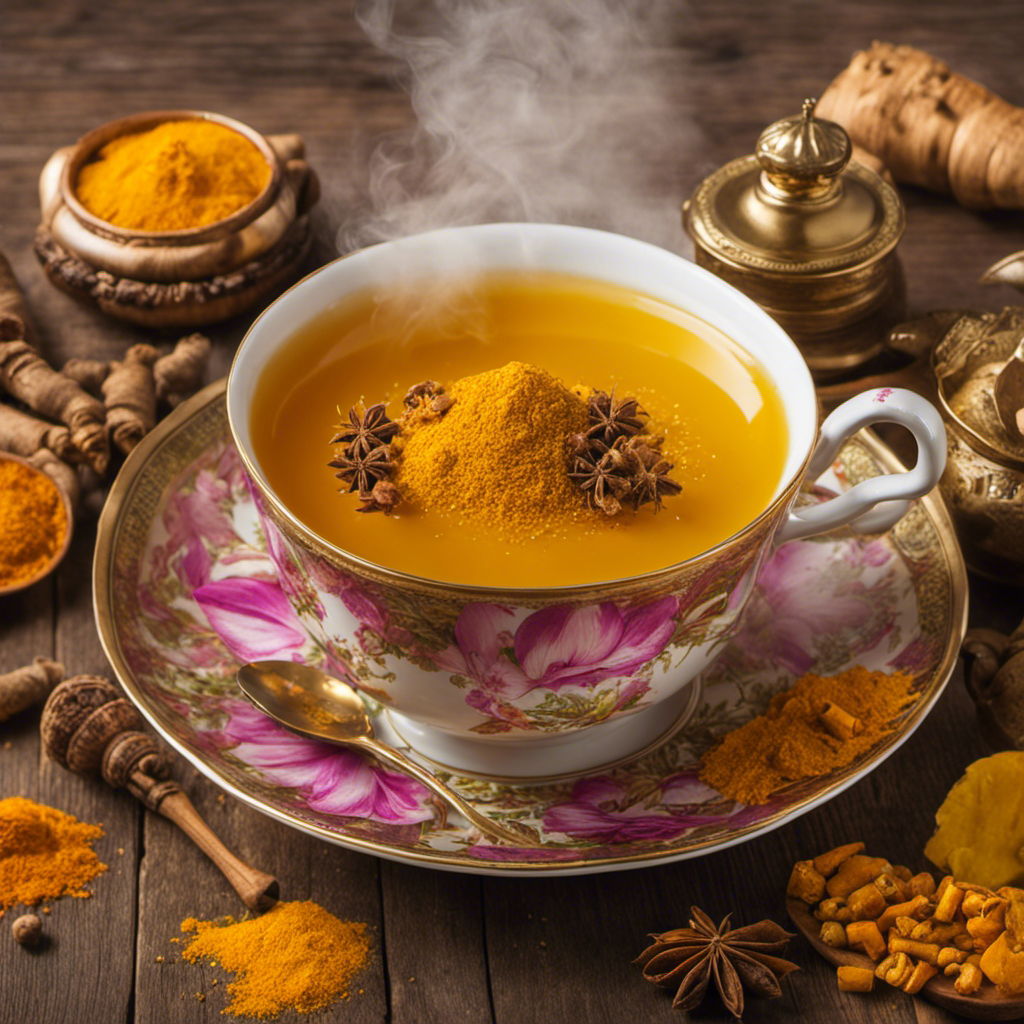
As someone who loves starting my day with a nice, hot cup of tea, I always make sure to be mindful of what I am consuming. This is why I chose to explore turmeric tea and its caffeine levels.
In this article, we’ll explore the benefits of turmeric tea, how it’s made, and most importantly, the caffeine levels found in this delicious beverage.
So grab a cozy blanket, settle in, and let’s uncover the truth about turmeric tea’s caffeine content.
Key Takeaways
- Turmeric tea contains a small amount of caffeine.
- The caffeine in turmeric tea provides a natural energy boost and acts as a stimulant on the central nervous system.
- Black tea has higher caffeine levels compared to green tea, which has lower caffeine content and a lighter taste.
- To enjoy turmeric tea without caffeine, steep it for a shorter amount of time or opt for caffeine-free alternatives like herbal tea blends.
Benefits of Turmeric Tea
One of the benefits of turmeric tea is that it can help reduce inflammation in the body. Turmeric contains a compound called curcumin, which has been shown to have anti-inflammatory properties. When consumed in the form of tea, curcumin is easily absorbed by the body, allowing it to target inflammation and provide relief.
In addition to reducing inflammation, turmeric tea also offers other health benefits. It is rich in antioxidants, which can help protect the body against damage from free radicals. Turmeric tea has also been linked to improved digestion, boosted immune function, and reduced risk of chronic diseases.
There are various turmeric tea recipes available, allowing you to customize your drink based on your taste preferences and desired health benefits.
How Turmeric Tea Is Made
To make turmeric tea, start by boiling water and adding your desired amount of turmeric powder or grated turmeric root.
Turmeric tea is a popular beverage known for its numerous health benefits. It contains a compound called curcumin, which has powerful anti-inflammatory and antioxidant properties. Studies have shown that curcumin may help reduce the risk of chronic diseases such as heart disease, cancer, and Alzheimer’s disease.
Turmeric tea is also known for its potential to aid digestion, boost the immune system, and promote healthy skin.
There are many turmeric tea recipes available, including adding ginger, honey, or lemon for added flavor and additional health benefits.
Overall, incorporating turmeric tea into your daily routine can be a simple and enjoyable way to improve your health.
Understanding Caffeine in Turmeric Tea
When you drink turmeric tea, you’ll experience the natural energy boost from its caffeine content. Caffeine is a stimulant that acts on the central nervous system, increasing alertness and temporarily reducing fatigue. Turmeric tea contains a small amount of caffeine, which can vary depending on the brewing method and the type of tea used.
While the caffeine content in turmeric tea may not be as high as in coffee or black tea, it can still provide a mild energy boost. However, if you’re looking for alternatives to turmeric tea that are caffeine-free, there are plenty of options available. Herbal teas like chamomile, peppermint, or rooibos are popular choices that offer a soothing and relaxing effect without the stimulating effects of caffeine.
Comparing Caffeine Levels in Different Teas
If you’re curious about the caffeine levels in different teas, you can compare the amount of stimulation they provide. Black tea and green tea are two popular options that offer different caffeine content.
On average, an 8-ounce cup of black tea contains about 47 milligrams of caffeine, while the same amount of green tea contains about 28 milligrams. However, it’s important to note that these numbers can vary depending on factors such as brewing time and tea quality.
Black tea generally has higher caffeine levels due to its longer oxidation process, which also gives it a stronger flavor. On the other hand, green tea is known for its lower caffeine content and lighter, more delicate taste.
Tips for Enjoying Turmeric Tea Without Caffeine
One way to savor turmeric tea without the jitters is by steeping it for a shorter amount of time. By doing this, you can still enjoy the benefits of turmeric without the added caffeine.
Here are a few tips for enjoying turmeric tea without caffeine:
-
Opt for caffeine-free alternatives: If you’re looking to cut back on caffeine, consider using herbal tea blends that don’t contain any caffeine. This way, you can still enjoy the flavors of turmeric without the stimulating effects of caffeine.
-
Try different turmeric tea recipes: Experiment with different recipes that incorporate turmeric, such as golden milk or turmeric latte. These recipes often use ingredients like almond milk or coconut milk, which add a creamy and soothing element to the tea.
-
Add natural sweeteners: If you find that turmeric tea without caffeine lacks a bit of sweetness, try adding natural sweeteners like honey or maple syrup. These options provide a touch of sweetness without the need for added caffeine.
-
Enjoy it in moderation: While turmeric tea may not contain caffeine, it’s important to still enjoy it in moderation. Too much of anything can have negative effects, so remember to listen to your body and consume turmeric tea in a balanced and mindful way.
Overall, by following these tips, you can savor the delicious flavors of turmeric tea without the caffeine jitters.
Conclusion
In conclusion, turmeric tea offers a multitude of benefits that can be enjoyed without the added caffeine. By opting for this herbal tea, you can still reap the advantages of its anti-inflammatory and antioxidant properties.
While other teas may contain varying levels of caffeine, turmeric tea stands out as a caffeine-free alternative. So go ahead, indulge in a cup of turmeric tea and savor its rich flavor and health-promoting qualities, all without the jolt of caffeine.
Noah, the Editor-in-Chief at Cappuccino Oracle, plays a pivotal role in shaping the voice and vision of our renowned platform. With an unwavering passion for coffee, coffee alternatives, and tea, Noah leads Cappuccino Oracle towards new horizons in the realm of coffee journalism.
Beyond his professional responsibilities, Noah serves as a mentor and guiding force for his team. His dedication to journalistic excellence and genuine love for coffee, coffee alternatives, and tea continue to inspire and motivate the Cappuccino Oracle family. In the ever-evolving world of these beverages, Noah’s leadership ensures that our platform remains at the forefront, delivering enlightening and enjoyable content to our readers worldwide.
Turmeric Tea
Imperial Organic Golden Turmeric Ginger Tea
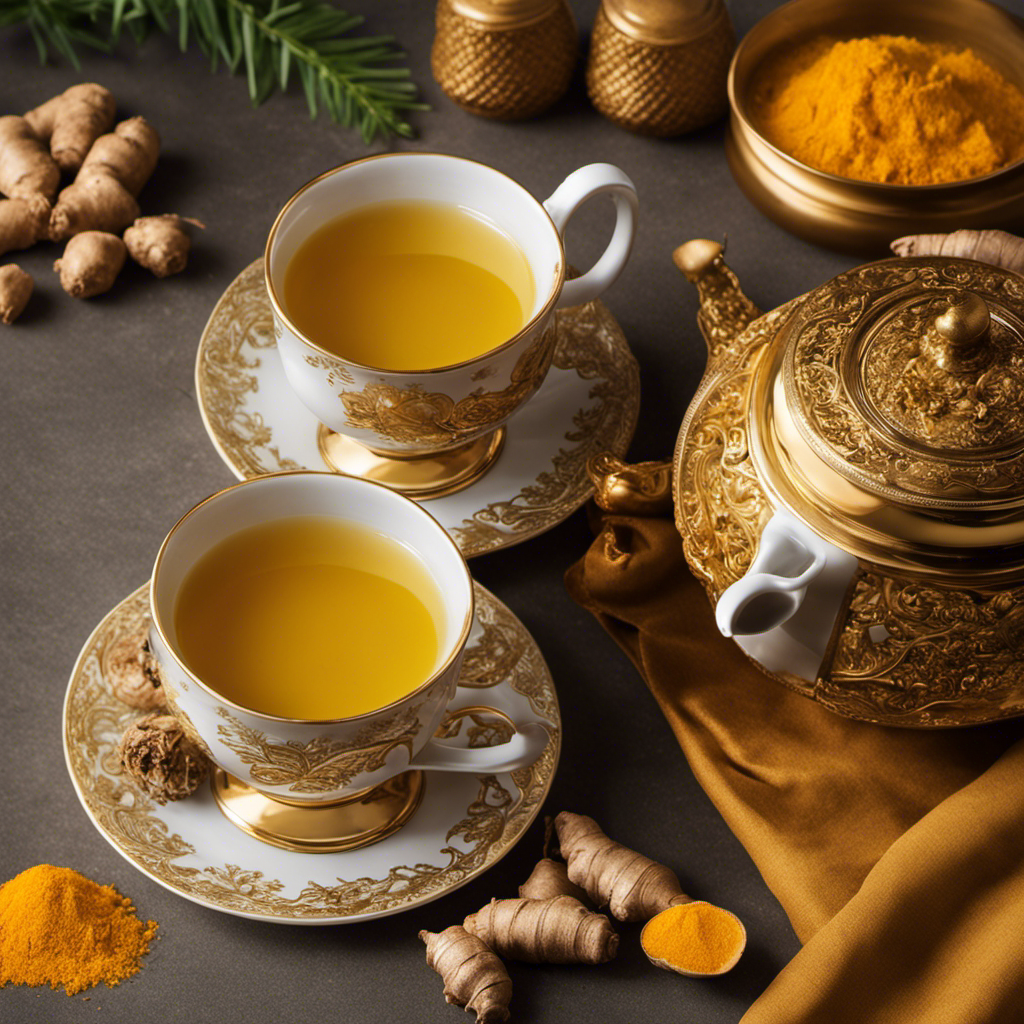
Are you in need of a calming and revitalizing drink that provides many health advantages? Imperial Organic Golden Turmeric Ginger Tea is the perfect choice for you.
This delightful blend combines the earthy notes of turmeric with the zesty kick of ginger, resulting in a harmonious marriage of flavors.
Not only does this tea provide a warm and comforting experience, but it also boasts a myriad of health benefits.
So, grab your favorite mug and get ready to embark on a journey of wellness and flavor with Imperial Organic Golden Turmeric Ginger Tea.
Key Takeaways
- Imperial Organic Golden Turmeric Ginger Tea has anti-inflammatory properties that can help reduce inflammation and alleviate symptoms of conditions like arthritis and joint pain.
- It aids in weight loss by boosting metabolism and promoting fat burning.
- The tea enhances digestion, reduces bloating, and increases feelings of fullness.
- It is rich in antioxidants and can boost the immune system for overall wellbeing.
Health Benefits of Turmeric Ginger Tea
You’ll love the health benefits of drinking turmeric ginger tea!
This golden elixir is not only delicious but also packed with a plethora of benefits for your wellbeing.
Turmeric ginger tea is renowned for its anti-inflammatory properties, which can help reduce inflammation in the body and alleviate symptoms of conditions such as arthritis and joint pain.
Additionally, the combination of turmeric and ginger in this tea can aid in weight loss by boosting metabolism and promoting fat burning.
The active compounds in turmeric and ginger work together to enhance digestion, reduce bloating, and increase feelings of fullness, making it a great addition to any weight loss regimen.
Now, let’s move on to how to make this golden turmeric ginger tea at home.
How to Make Golden Turmeric Ginger Tea
To make this delicious tea, start by bringing water to a boil in a small pot. Once the water is boiling, follow these simple steps to create a soothing cup of golden turmeric ginger tea:
- Add 1 teaspoon of imperial organic golden turmeric ginger tea leaves to a tea infuser or teapot.
- Pour the boiling water over the tea leaves and let it steep for 5-7 minutes.
- Remove the tea infuser or strain the tea leaves from the pot.
- Add a squeeze of lemon juice or a teaspoon of honey for added flavor, if desired.
Golden turmeric ginger tea offers a wealth of health benefits. The combination of turmeric and ginger provides anti-inflammatory properties, aids digestion, and boosts the immune system. This tea is also rich in antioxidants and can help reduce inflammation and promote overall wellbeing.
With its warm and earthy flavor, this golden turmeric ginger tea is a delightful and rejuvenating beverage to enjoy throughout the day.
The Origins of Turmeric Ginger Tea
If you’re curious about the origins of this soothing beverage, it has been enjoyed for centuries in various cultures around the world.
Turmeric ginger tea holds great cultural significance and has long been used in Ayurveda, the traditional Indian system of medicine. Both turmeric and ginger have been prized for their medicinal properties, and when combined, they create a powerful elixir. In Ayurveda, this tea is believed to have numerous health benefits, including reducing inflammation, boosting immunity, and aiding digestion.
The warm and spicy flavors of turmeric and ginger create a comforting and aromatic drink that can be enjoyed at any time of the day.
Now that you know about the origins and cultural significance of turmeric ginger tea, let’s explore the best time to enjoy a cup.
Best Time to Enjoy a Cup of Turmeric Ginger Tea
When consumed in the morning or before bed, turmeric ginger tea can provide a soothing and invigorating start or end to your day. This delightful beverage offers numerous benefits for digestion, making it an excellent choice for both morning and evening consumption.
Here are three reasons why you should incorporate turmeric ginger tea into your daily routine:
-
Boosts digestion: The combination of turmeric and ginger in this tea stimulates the production of digestive enzymes, aiding in the breakdown of food and promoting a healthy gut.
-
Reduces bloating: Turmeric ginger tea possesses anti-inflammatory properties that can help reduce bloating and discomfort, making it an ideal choice after a heavy meal.
-
Calms the stomach: Ginger has been used for centuries to alleviate nausea and indigestion, making turmeric ginger tea a natural remedy for an upset stomach.
Now that you know the benefits of turmeric ginger tea, let’s explore some tips for enhancing its flavor and maximizing its potential.
Tips for Enhancing the Flavor of Turmeric Ginger Tea
Enhancing the flavor of turmeric ginger tea can be done by adding a squeeze of lemon or a dash of honey. These simple additions can transform your tea into a delightful and refreshing beverage. But why stop there? With a little creativity, you can take your turmeric ginger tea to the next level. Try experimenting with different ingredients to create unique and flavorful tea recipes. For example, you can add a pinch of cinnamon for a warm and spicy twist, or a few slices of fresh orange for a citrusy kick. Don’t be afraid to think outside the box and pair your turmeric ginger tea with food. It can be a perfect accompaniment to a light salad or a savory sandwich. Let your taste buds guide you and enjoy the endless possibilities of turmeric ginger tea!
| Creative Turmeric Ginger Tea Recipes | Pairing Turmeric Ginger Tea with Food |
|---|---|
| 1. Turmeric Ginger Chai Latte | 1. Grilled Salmon with Turmeric |
| 2. Golden Turmeric Smoothie | 2. Turmeric Ginger Chicken Stir-Fry |
| 3. Turmeric Ginger Iced Tea | 3. Turmeric Ginger Rice |
| 4. Turmeric Ginger Lemonade | 4. Turmeric Ginger Roasted Veggies |
| 5. Turmeric Ginger Golden Milk | 5. Turmeric Ginger Salad Dressing |
Frequently Asked Questions
Can I Drink Turmeric Ginger Tea if I Have a Sensitive Stomach or Digestive Issues?
If you have a sensitive stomach or digestive issues, it’s important to consult with a healthcare professional before drinking turmeric ginger tea. They can assess whether it’s suitable for you and discuss potential benefits for weight loss and inflammation.
Is Turmeric Ginger Tea Safe to Consume During Pregnancy or While Breastfeeding?
During pregnancy or while breastfeeding, it is important to consider the safety of consuming turmeric ginger tea. It is advised to consult with your healthcare provider about the recommended dosage and potential benefits for your overall health.
Can I Add Honey or Other Sweeteners to Enhance the Taste of Turmeric Ginger Tea?
Yes, you can add honey or other sweeteners to enhance the taste of turmeric ginger tea. Not only will it make the tea more enjoyable, but honey also has its own health benefits, such as soothing a sore throat and boosting your immune system.
Does Turmeric Ginger Tea Interact With Any Medications or Supplements?
Turmeric ginger tea can interact with medications and supplements. It’s important to consult with a healthcare professional to ensure its safety. However, it’s worth noting that turmeric ginger tea may offer potential benefits for inflammation.
Are There Any Potential Side Effects or Risks Associated With Drinking Turmeric Ginger Tea Regularly?
Drinking turmeric ginger tea regularly can have potential benefits for your health. However, it’s important to be aware of potential side effects or risks. Consult with a healthcare professional for personalized advice.
Conclusion
So now you know the incredible health benefits of Imperial Organic Golden Turmeric Ginger Tea. By incorporating this delicious and soothing beverage into your daily routine, you can experience a wide range of benefits. These include reducing inflammation, boosting immunity, improving digestion, and promoting relaxation.
Don’t wait any longer, start brewing your own cup of this golden elixir today and witness the magic for yourself. Remember, a warm and comforting cup of Turmeric Ginger Tea is the perfect companion for any time of day – morning, afternoon, or evening.
Cheers to good health!
Noah, the Editor-in-Chief at Cappuccino Oracle, plays a pivotal role in shaping the voice and vision of our renowned platform. With an unwavering passion for coffee, coffee alternatives, and tea, Noah leads Cappuccino Oracle towards new horizons in the realm of coffee journalism.
Beyond his professional responsibilities, Noah serves as a mentor and guiding force for his team. His dedication to journalistic excellence and genuine love for coffee, coffee alternatives, and tea continue to inspire and motivate the Cappuccino Oracle family. In the ever-evolving world of these beverages, Noah’s leadership ensures that our platform remains at the forefront, delivering enlightening and enjoyable content to our readers worldwide.
Turmeric Tea
Powdered Turmeric Tea
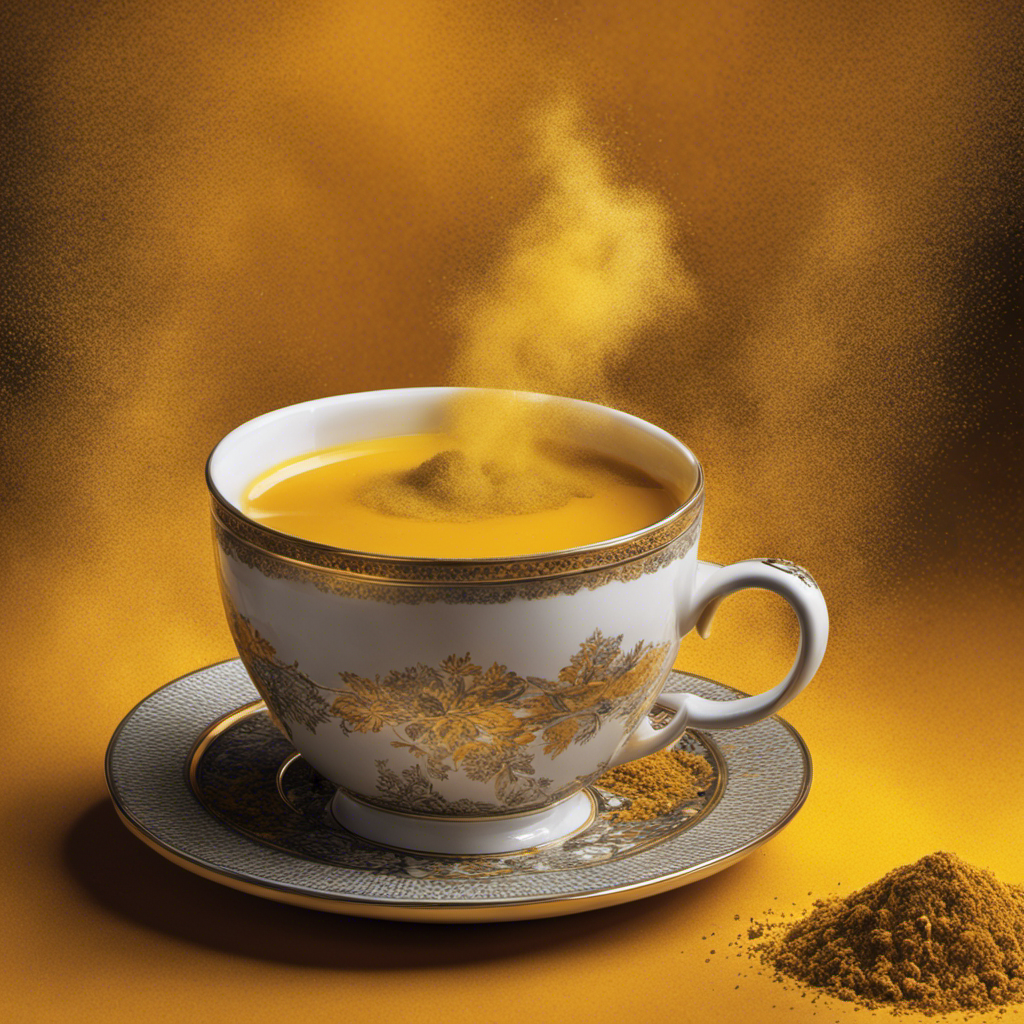
I understand your skepticism about yet another health trend promising miraculous results. However, powdered turmeric tea could actually be the answer. As a food and beverage scientist, I have thoroughly researched and discovered convincing evidence backing the health benefits of this golden elixir.
From its potent anti-inflammatory properties to its potential to boost brain health, turmeric tea is worth exploring. So, let’s dive into the science behind this ancient remedy and discover how to make the most of its potential.
Key Takeaways
- Powdered turmeric tea contains curcumin, which has anti-inflammatory, antioxidant, and anticancer effects.
- Regular consumption of powdered turmeric tea may reduce the risk of chronic diseases like heart disease, diabetes, and cancer.
- Powdered turmeric tea aids in digestion and relieves gastrointestinal discomfort.
- Drinking powdered turmeric tea can potentially enhance brain function and improve cognitive health.
Health Benefits of Powdered Turmeric Tea
You’ll be amazed at the health benefits of powdered turmeric tea.
As a food and beverage scientist, I can attest to the numerous advantages of incorporating this powerful spice into your daily routine.
Turmeric, scientifically known as Curcuma longa, contains a bioactive compound called curcumin, which is responsible for its vibrant yellow color and potent medicinal properties.
Research studies have shown that curcumin possesses anti-inflammatory, antioxidant, and anticancer effects, making it a valuable addition to your diet.
Consuming turmeric tea may help reduce the risk of chronic diseases such as heart disease, diabetes, and cancer.
Additionally, turmeric tea can aid in digestion, boost immunity, and improve brain function.
To maximize the benefits, consider adding black pepper or a healthy fat source like coconut oil to enhance curcumin absorption.
Experiment with different turmeric tea recipes to find your favorite combination and enjoy the remarkable health benefits of this ancient spice.
How to Make Powdered Turmeric Tea
Mix together the ground turmeric, ginger, black pepper, and honey in a saucepan. The combination of these ingredients creates a flavorful and aromatic base for powdered turmeric tea.
Here are some reasons why you should consider trying this delightful beverage:
-
Boosts immune system: Turmeric is rich in curcumin, a compound known for its immune-boosting properties.
-
Anti-inflammatory effects: Curcumin has been shown to reduce inflammation in the body, which may help alleviate symptoms of chronic conditions such as arthritis or inflammatory bowel disease.
-
Supports digestion: Ginger and black pepper in the tea can aid in digestion and relieve gastrointestinal discomfort.
-
Versatility: Powdered turmeric tea can be used as a base for other delicious beverages like turmeric lattes or smoothies.
Different Variations of Powdered Turmeric Tea
To change things up and add variety to your turmeric beverage, consider experimenting with different flavors and ingredients.
Powdered turmeric tea is not only known for its vibrant yellow color and distinct earthy taste but also for its potential health benefits.
Adding complementary flavors like ginger, cinnamon, or honey can enhance the overall taste profile of your turmeric tea.
Additionally, you can incorporate other ingredients such as lemon, black pepper, or cardamom to further enhance the flavor and add a unique twist.
These variations not only provide different taste experiences but can also provide additional health benefits due to the synergistic effects of the combined ingredients.
So, don’t be afraid to get creative and explore different combinations to find the perfect flavor blend for your powdered turmeric tea.
Remember to adjust the quantities of the ingredients to suit your personal preference.
Enjoy your turmeric tea as a warming beverage or try it chilled over ice for a refreshing twist.
Tips for Enhancing the Flavor of Powdered Turmeric Tea
Don’t forget to experiment with different spices and herbs to enhance the flavor of your turmeric beverage. Here are some tips for enhancing the taste of your powdered turmeric tea:
- Add a pinch of cinnamon for a warm and aromatic flavor.
- Try a dash of ginger for a spicy kick.
- Experiment with a sprinkle of cardamom for a unique and exotic taste.
- Consider adding a touch of black pepper to enhance the absorption of curcumin, the active compound in turmeric.
Brewing techniques can also play a role in enhancing the flavor of your turmeric tea. Make sure to steep the tea for the recommended time to allow the flavors to fully develop. Additionally, using high-quality turmeric powder can make a significant difference in taste. Remember to choose a reputable brand that focuses on sourcing and processing methods to ensure the highest quality product.
Potential Side Effects of Consuming Powdered Turmeric Tea
Consuming powdered turmeric tea may have potential side effects that should be considered.
As a food and beverage scientist, it is important to provide objective and unbiased information about the long-term effects and interactions with medication of powdered turmeric tea.
Turmeric, scientifically known as Curcuma longa, contains a compound called curcumin, which has been extensively studied for its health benefits. However, it is also important to note that curcumin can interact with certain medications, such as blood thinners, leading to potential complications.
Additionally, high doses of curcumin may cause digestive issues such as stomach upset and diarrhea.
Although turmeric tea has been associated with various health benefits, including anti-inflammatory and antioxidant properties, it is crucial to consult with a healthcare professional before incorporating it into your diet, especially if you are taking medications or have any underlying health conditions.
Conclusion
In conclusion, powdered turmeric tea is a remarkable beverage that offers numerous health benefits. Its chemical composition, including the presence of curcumin, provides antioxidant and anti-inflammatory properties that can support overall well-being.
Scientific research has shown its potential to improve digestion, boost immunity, and even reduce the risk of chronic diseases. However, it is crucial to consume turmeric tea in moderation and be aware of potential side effects, such as digestive issues or allergic reactions.
With its rich nutritional content and promising health effects, powdered turmeric tea can be a valuable addition to a balanced diet.
Arf, an author and an innovative enthusiast of coffee, coffee alternatives, and tea, plays a crucial role as a contributor to the esteemed Cappuccino Oracle platform. Renowned for his curiosity and passion for these captivating beverages, Arf has carved out a unique space for himself in the world of exploration and writing. He realized that coffee, coffee alternatives, and tea are not mere drinks to keep one awake, but universes of flavors and stories waiting to be explored.
Arf’s articles for Cappuccino Oracle blend meticulous research with personal experiences, providing readers with an in-depth understanding of various types of coffee, coffee alternatives, and tea, along with their unique characteristics, cultures, and histories. His honest reviews and engaging narratives guide readers on their own journeys, helping them discover their preferences and find their perfect brew.
-
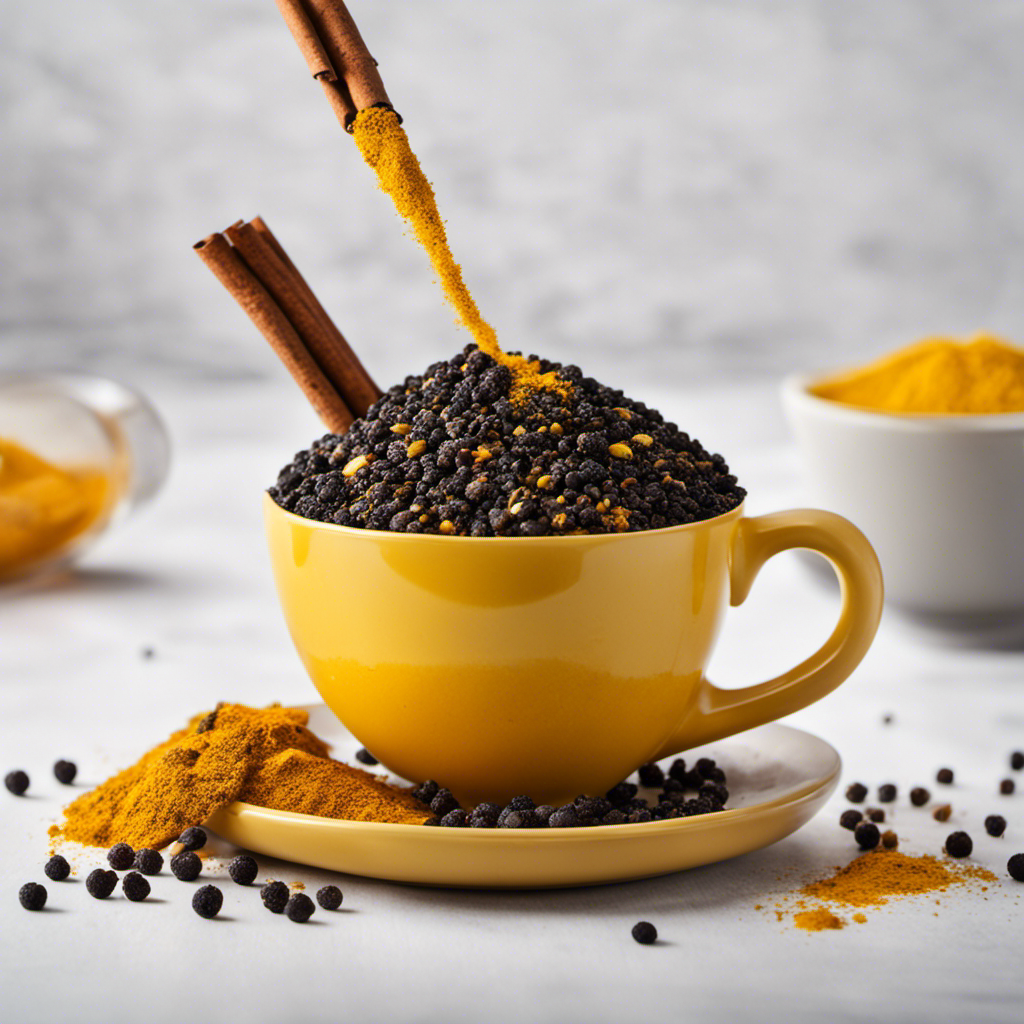
 Turmeric Tea4 weeks ago
Turmeric Tea4 weeks agoTurmeric Ginger, Cinnamon Black Pepper Tea Recipe
-
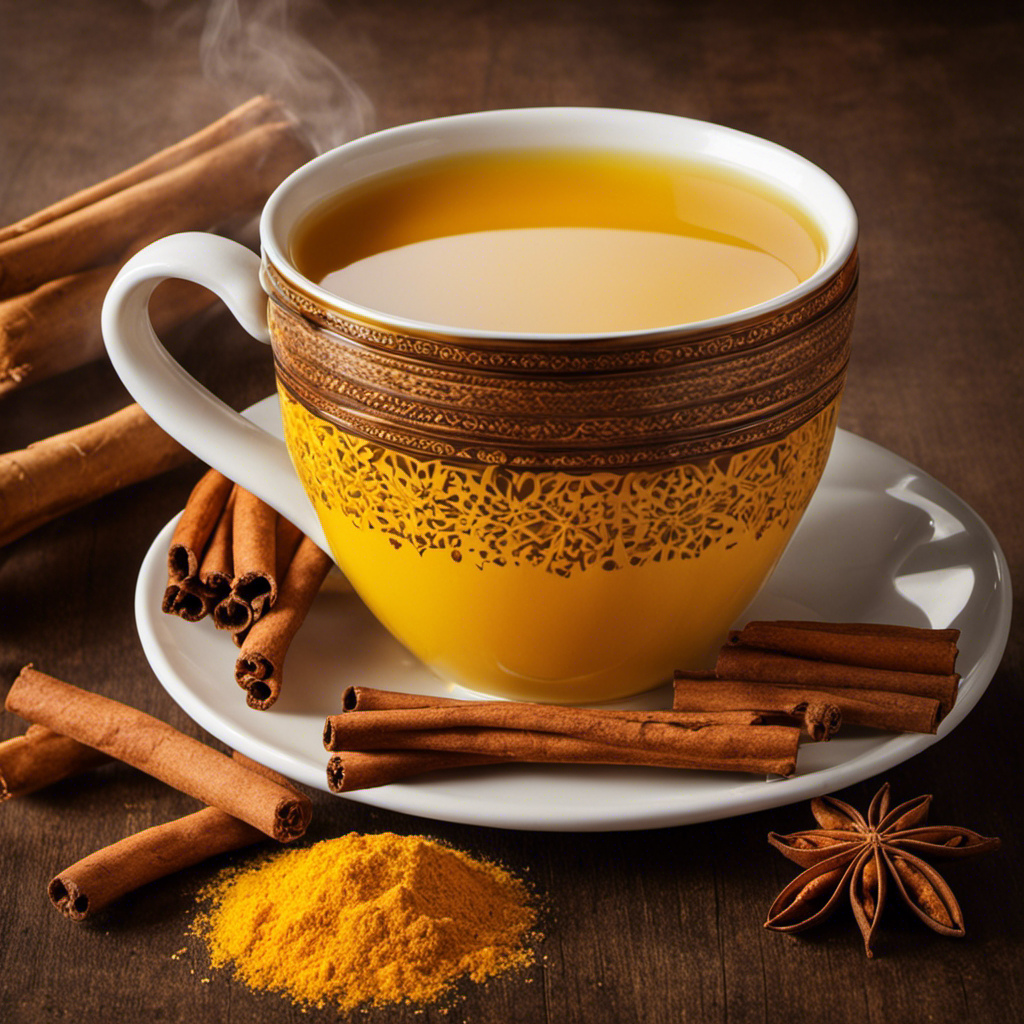
 Turmeric Tea3 weeks ago
Turmeric Tea3 weeks agoTurmeric Ginger Cinnamon Tea for Weight Loss
-

 Americano2 weeks ago
Americano2 weeks agoHow Many Calories Are in a Americano
-
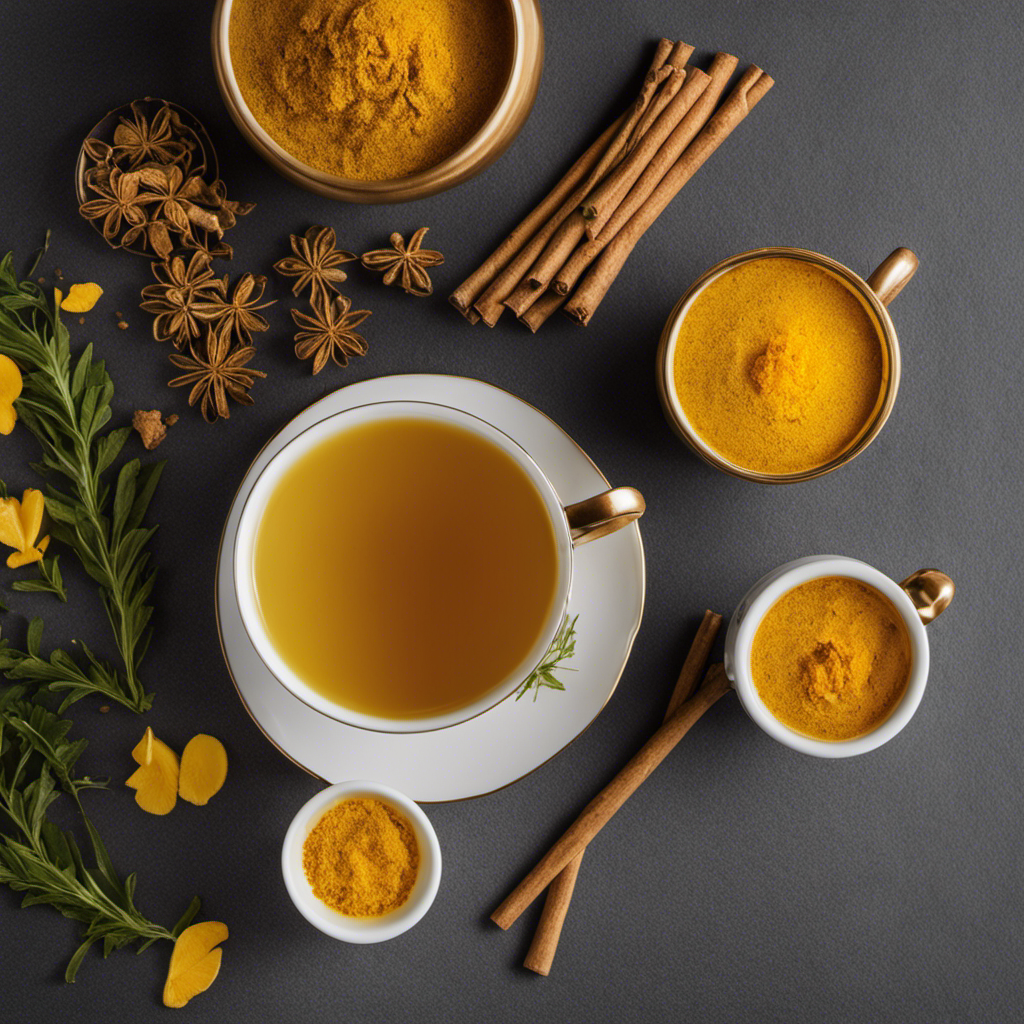
 Turmeric Tea4 weeks ago
Turmeric Tea4 weeks agoTurmeric Ginger Licorice Tea Benefits
-

 Americano5 days ago
Americano5 days agoHow to Make an Americano in a French Press
-

 Americano1 day ago
Americano1 day agoWhat to Add to an Americano at Starbucks
-

 Turmeric Tea3 weeks ago
Turmeric Tea3 weeks agoTurmeric Tea Weight Loss Success Stories
-

 Americano5 days ago
Americano5 days agoHow to Make Americano With a Nespresso Machine

















